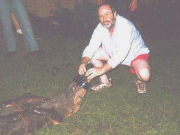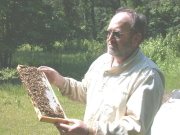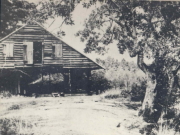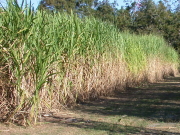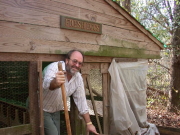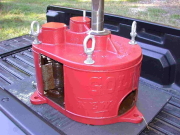|
Elison Hendley and family (Nashville, Georgia) John A. Gaskins had vast holdings of land in the Ten-mile Bay, and the reasons he removed about 1910 a short distance to homestead what I always knew as the Perry Hendley Place have been erased by time. In 1941, sometime after Mr. John A. died, Mr. Perry Hendley bought the farm. The families had been connected before that, though, as Mr. Perry's father, Mr. Walt, lived in the Ten-mile Bay and Mr. Perry had worked for the Gaskins family in the turpentine business for several years. Mr. John A. was long before my time, but I remember Mr. J. Henry, Mr. John A.'s son. Mr. J. Henry owned a lot of land, too, and even money that he used to make interest-bearing signature loans. Mr. Walt was also before my time. At any rate, the eastern part of Berrien County has been and is thick with Hendleys. I don't know all the family connections, but suffice it to observe the large number and early times of Hendleys in Folks Huxford's Pioneers of Wiregrass Georgia. (As I advised, this particular narrative about cane mills is rambling, long-winded, and personal. Worse, this paragraph is anticlimactic, being more a description of the times than a linear account. Regardless, I feel an obligation to report myself as it relates to an East-Berrien Hendley, Mr. Hilton Hendley, the game warden. I have also written this paragraph because it puts a limit on the extent of mischief that wholesome young boys allowed themselves in the rural South in the 1950s and 1960s. There was a veritable gang of young boys who let their time drift between school, work, and entertainment, which consisted of two main types, hunting and bragging about hunting. (It was not scary to be alone at dark up to the crotch in a swamp hunting ducks, but it was way too scary to talk to a girl at that time, so entertainment was hunting and bragging about hunting.) Of course, among the boys, some specialized more in entertainment than school and work. Context is needed. For an urbane reader or for a younger person--if one does not have the advantage of descent from Highland stock--it might be a little difficult to understand right away how a person can be passionately disrespectful of authority, but respect the person upholding the law. That is the way we were and I won't bore you with the details, but it is a heritable trait, expressing itself in the general population as teen rebellion, but constituitively expressed across all demographics in my little hometown. As an example, I once watched my father, whose pride, independence and stubbornness bordered on pathological, patiently wait until a policeman completed a parking ticket, only to remove it, shred it, throw it on the ground, all done with the full attention of the policeman. As a second example, I was a small child when we were stopped for speeding. It was a short diversion as apparently Daddy was obliged to remind the patrolman that the personal allegiance he had to a fellow Mason exceeded that he had to the law. As a final example and one I find humor in, Willie Luke (the husband of Aunt Maggie, grandfather L.G. Outlaw's sister) lived in Lanier County, but wanted his children to attend school in Berrien County. The law didn't stand in the way and Daddy sent the school bus to snatch those children everyday and bring them to the good schools in Berrien County. All this was small stuff for someone who had bootlegged (and worse) earlier in his life. [I must note that my sister had a conniption about this statement, thinking it sullied my father's memory. She added that he was young, homeless, and under the influence of others. I noted these "others" were his uncles. She replied that one of them was a preacher. I said that made the remaining one even worse. We found common ground finally by acknowledging that this enterprise was not a way to make a living, but just a sideline, like making syrup is for most folks these days.) In sum, I was about 11 when I realized that when Daddy declined something "because it is illegal," he was just politely refusing. That is all to say that, at best, laws were considered guidelines, but usually laws were considered more like one person's opinion of how to do something. Thus, we all started driving before the legal age, and most of our parents were more concerned about how they were going to get us off motor scooters and motorcycles and into something with a little more metal protecting us. In short, by 14, we were free agents in cars, trucks or pieces of one of those, and this gave us access to the whole outdoors, at almost any time of day or night. Disrespecting authority, we were an unorganized gang, but for early-morning hunting for doves, strictly illegal, we'd meet over at Dr. Brown's, who went out of his way to appear gruff, but the twinkle in his eyes gave him away. Mrs. Brown, bless her soul, just took it all as a mother's duty to get up at 4:30 am and cook breakfast for whatever bunch of boys Butch invited. Butch was popular (as were his parents), so the group was large and might include Hank Snead, the best shot among us, one of my best friends, and one who specialized more in entertainment than school or work, and Chip Yancey, also one of my best friends, who worked hard but studied hard too, and was a little short on entertainment if anything. These three friends and many other neighborhood boys (Lamar Weeks, Henry Gray, Chuck Herndon, Bill Mathis, Freddie Duncan, Wayne Watson, Tommy Hand, Jimmy Watson, to mention a few) died long before their time leaving many of us (Terry Smith, Harry McNabb, Bob Lovein, Dane Perkins, to mention a few others) sad, but cherishing the memories all the more. As the eating and the bragging stage of hunting ended, the gang would pile up into cars, particularly Butch's old Ford station wagon, and head for the fields to hunt illegally. Just before leaving Butch's, it was an uncommon amount of fun to call the radio station and have "On the wings of a snow white dove, God sent his pure sweet love . . ." played and dedicated to Mr. Hilton. I don't know whether he knew about our taunts, but in our minds, it elevated the cost of getting caught as we were not only the predator, but also prey. Looking back, I'm glad he didn't catch us since it just would have enraged our parents against authority, and I absolutely, totally, and unconditionally guarantee that our parents would have embraced us, hunkered down, and defeated any offensive. As I said, I am glad we weren't caught, but I do smile if I think about what the glare on my mother's face would have looked like. I'd bet that if she had not been able to use that glare, as close to a snarl as a glare can be, she would have had to curse from time to time.) For the remainder of this narrative, I will properly focus on Mr. Perry Hendley and his son, Elison. Their farms joined our family farms (see Mark Watson), being near the Ten-Mile Creek that originated at Avera Mill Pond (now, Lake Lewis). In the end, we were even closer as Elison bought the Joe Holland place when it became available. (Granny Watson never let Grandpa live down the fact that he didn't buy this place, but I think that Grandpa was happy with what he had, and Granny Watson's family did not serve as an inspiring financial model anyhow.) Specifically, the land north of that marked "Herbert Watson" is the Joe Holland place and the land joining that to the east is the Perry Hendley place (see paragraph 1). This proximity obviously lead to many interactions, all of them positive from my point-of-view, formed early and maintained until the present. I was indeed in awe of the Hendleys. They seemed to stand a little taller, wear stiffer shirts, keep cleaner fence rows, have better pastures, and Elison, in particular, made a fine figure riding his horse. When I look back, I can think of many things that the Hendleys did for me, but nothing I have done for them, except maybe take good care of pleasant memories. As some small examples, Mr. Perry chipped our trees (really, it was a fine black elderly employee of Mr. Perry, Mr. Sylvester Copeland, who cleared the paths from tree-to-tree, who used the hack to cut streaks, who used the broadaxe to put in the gutter, who hung the cups, who scraped the face, and who dipped the gum-how prophetic was his name!). Mr. Perry and Elison gave me my first cane. On another occasion, Elison pulled me out of the ditch and realized I didn't need to be lectured (and even politely pretended to have forgotten about it years later). . . . and, the list could go on.
As time goes by, I value my earlier memories more,
and I suppose one of the memories that many people cherish most is when they
first became useful. When I was growing up, times were hard for many people
in the rural South. Indeed, it took some years for the post-war prosperity to
come South, and the process in rural areas never completed. Doing for oneself
was a necessary habit. Therefore, when Mama's brother Sam renovated the house
on a farm he had bought, his lumber was standing as pines down on the Grandma
place (shown as "Herbert Watson" on the map of my farm.) He hired the trees felled, but sawed them up himself.
I spent a good deal of my time with my uncles as both my parents had city
jobs. I was always anxious to "help," and Sam's standard reply was, "it'd
help if you'd get out of the way and keep your mouth shut." But, using a
cross-cut saw requires two people, so I became the second person. There is no
comparison between zipping through a tree with a modern chain saw and
dragging a cross-cut saw through a tarry log. (Who can remember a corked
whiskey bottle full of turpentine, which was drizzled on the saw to cut the
tar?) Sam was patient and was smart enough not to expect too much of me. In
the end, though, I was a helper doing a man's work (far far superior to being
Mrs. Browning's runner on a paper-collection route), and I was proud
(although I probably did a minuscule amount of work). The logs were taken to
Mr. Perry's place for sawing. On his return from the war, Although it is still common practice to "drop in" on
folks in my hometown, I only take that liberty with a few of my relatives.
Thus, I don't visit with Elison overly much, but when I catch him outside, I
always stop and enjoy reminiscing with him. Our conversations drift widely,
but often around sugar-cane syrup. At one time, we may discuss curing
sweetpotatoes, a valuable anywhere food for sustenance farmers. Our
sweetpotatoes were often sliced, fried, and drenched with cane syrup, along
with the accompanying sausage. Else, they were baked. Ordinarily, there were
baked sweetpotatoes all day long on Granny's table. (But, to this day, I
don't want to reach down into a dark potato bank for fear of inconveniencing
a snake or rat.) Our discussions have turned to Sweet Water, the original
power drink. A Mason jar full of water sweetened with sugar-cane syrup (about
a pint of syrup to the gallon, also known as squeezle, especially by the
turpentiners [see Butler C.B. (1998) Treasures of the longleaf
pines--naval stores. Tarkel Publishing Co., Shalimar, FL) was usual for
field hands during the first part of the last century (but, by the 1950s,
farmers were more-or-less obliged to give each hand a 6-ounce Coke morning
and afternoon). I like to talk about Sweet Water because it reminds me of my
father, who ate everything (cheese, butter, bread, pork chops, fish) covered
with sugar-cane syrup. I have some of these habits, too, and I suppose they
seem unsophisticated to the inexperienced palate. There's also some amusement
talking with Elison as well as my mother's other brother, Herbert, about
getting hogs drunk. That would happen when the skimmings were allowed to
ripen. Sometimes, though, it was not by chance. Daddy and his friend Seward McNabb did a little
hobby farming. I can't say it was a good idea, but they filled 50-gallon
barrels about ¾ full of corn, covered it with water, and poured in
sugar-cane syrup (which was pretty cheap sometimes in the spring after it had
gotten strong). Well, you can image how popular with the hogs this meal
became after a few days of bubbling! Thanks to Fred Knowles for sharing the photograph of his grandfather, Seward McNabb. Thanks to Lawrence Copeland for obtaining and sharing the photograph of his father, Sylvester Copeland. Thanks to John Crawford for restoring the photograph of Mr. Copeland. Thanks to Willard Smith for introducing me to the term, squeezle, a synonym for sweet water. Thanks to Jimmy Griffin for suggesting Butler's book. Thanks to Ken Christison for his astute observation that "squeezle" phonetically resembles "switchel," a sweet drink similar to ginger ale. |
